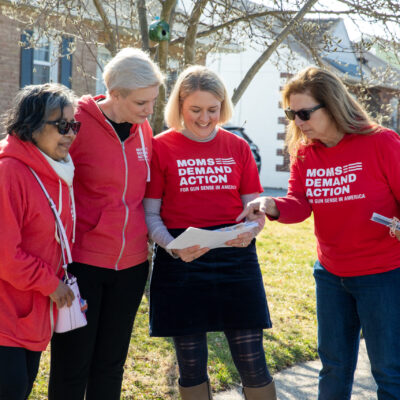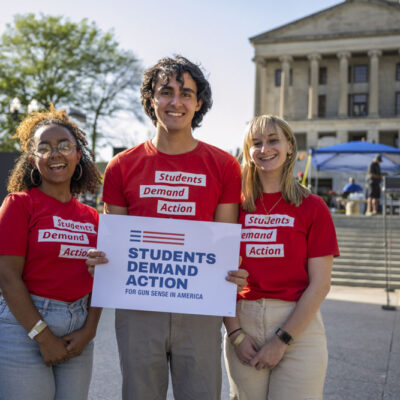Mass Shootings
What is the problem?
In the eight years between 2015 and 2022, over 19,000 people were shot and killed or wounded in the United States in a mass shooting. The reach of each mass shooting stretches far beyond those killed and wounded, harming the well-being of survivors, their families, and entire communities.
Mass shootings do not need to be an inevitable element of American life. Just like all other tragic forms of gun violence, we can prevent them through common-sense policy solutions.
Why is it an issue?
Mass shootings are preventable.
The United States is not the only country with mental illness, domestic violence, video games, or hate-fueled ideologies, but our gun homicide rate is 26 times higher than our peer countries.1Everytown analysis of the most recent year of gun homicides by country (2013 to 2019), GunPolicy.org (accessed January 7, 2022). The difference is easy access to guns. In fact, even within the U.S., states with weaker gun laws and higher gun ownership rates have higher rates of mass shootings.2Paul M. Reeping et al., “State Gun Laws, Gun Ownership, and Mass Shootings in the US: Cross Sectional Time Series,” BMJ 364 (March 2019): 1542, https://doi.org/10.1136/bmj.l542.
Lawmakers must act to require background checks on all gun sales, support Extreme Risk laws that provide a process to temporarily remove guns from people showing warning signs, keep guns out of the hands of domestic abusers, and restrict assault weapons and high-capacity magazines.
By the numbers
1 in 4
1 in 4 mass shooters in incidents with four or more people killed were legally prohibited from possessing firearms at the time of the shooting.
32%
In 32 percent of mass shootings with four or more people killed, the shooter exhibited dangerous warning signs before the shooting.
2x
From 2015-2022, shootings with four or more people killed where assault weapons were used resulted in more than twice as many people killed.
46%
In at least 46 percent of mass shootings with four or more people killed the perpetrator shot a current or former intimate partner or family member.
What are the solutions?
-
Background Checks on All Gun Sales
Background checks are the foundation of any comprehensive gun violence prevention strategy. Current federal law requires that background checks be conducted whenever a person attempts to buy a gun from a licensed gun dealer. This is to ensure that the buyer is not legally prohibited from having the gun. Since federal law began requiring these background checks in 1994, background checks have blocked millions of sales to people with felony convictions or other prohibiting histories.1United States Department of Justice, Office of Justice Programs, Bureau of Justice Statistics, “Publications & Products: Background Checks for Firearm Transfers,” https://bit.ly/2F4vMYw. Data on federal- and state-level denials were obtained from the BJS reports for the years 1999–2010 and 2012–2020. Local-level denials were available and included only for the years 2012, 2014–2018, and 2020 from the BJS reports. Data for the years 2011 and 2021 were obtained by Everytown for Gun Safety from the FBI directly. Though the majority of the transactions and denials reported by the FBI and BJS are associated with a firearm sale or transfer, a small number may be for concealed-carry permits and other reasons not related to a sale or transfer.
-
Extreme Risk Laws
When a person is in crisis and considering harming themselves or others, family members and law enforcement are often the first people to see the warning signs. Extreme Risk laws, sometimes referred to as “Red Flag” laws, allow loved ones or law enforcement to intervene by petitioning a court for an order to temporarily prevent someone in crisis from accessing guns.
-
Prohibit People With Dangerous Histories From Having Guns
People with dangerous histories must be prohibited from having guns. Federal law prohibits gun possession by certain categories of people. States also set standards for who is too dangerous to have guns. People prohibited by federal or state law will fail a background check if they try to buy a gun from a licensed dealer.
-
Prohibit Assault Weapons
Assault weapons are exceptionally deadly firearms commonplace in mass fatality shootings. They are generally capable of firing far more bullets, far faster than manual-action hunting rifles. Prohibiting assault weapons can prevent mass shooting injuries and deaths.
-
Prohibit High-Capacity Magazines
Firearms equipped with high-capacity magazines make instances of violence exceptionally deadly. High-capacity ammunition magazines, commonly defined as those capable of holding more than 10-rounds, are a threat to public safety and should be prohibited.
-
Prohibit Auto Sears, Bump Stocks, and Other Rapid-Fire Devices
Fully automatic machine guns—those that fire bullets in rapid succession with a single pull of the trigger—and the parts used to create them have been tightly regulated under federal law since the 1930s.1US Bureau of Alcohol, Tobacco, Firearms and Explosives, “National Firearms Act,” April 7, 2020, https://www.atf.gov/rules-and-regulations/national-firearms-act. However, the gun industry and third-party sellers continue to produce devices that make it easy to convert semi-automatic firearms into illegal machine guns in a matter of minutes.
-
Block Silencer Deregulation
Silencers pose a significant danger in the wrong hands. They make it harder for bystanders or law enforcement to identify and react quickly to gunshots. Policymakers should block the gun lobby’s dangerous efforts to deregulate silencers.
-
Disarm Hate
Guns and hate are a fatal combination. In an average year, more than 25,000 hate crimes in the United States involve a firearm—more than 69 each day.1Everytown Research analysis of the National Crime Victimization Survey (NCVS). A yearly average was developed using 12 years of the most recently available data: 2010 to 2021. In parts of the US, some people convicted of hate crimes can still legally buy and have guns. Congress and state legislatures must pass laws that keep guns out of the hands of those who have been convicted of hate crimes.




